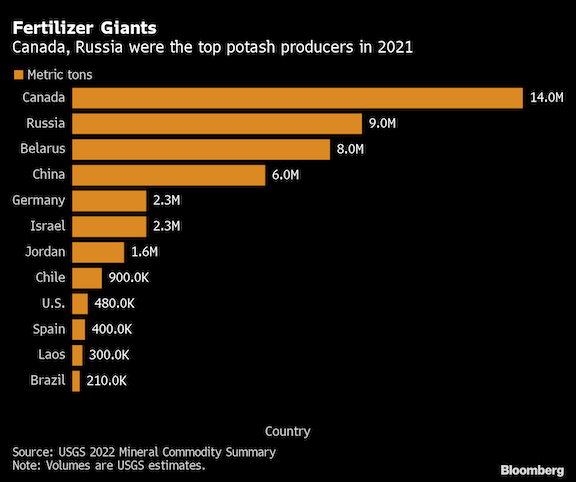More price hikes for fertilizer are on the horizon as the Russia-Ukraine crisis adds to fears of global shortages, stoking concerns about rising food costs.
Russia is a low-cost, high-volume global producer for all major fertilizers, and it’s the world’s second-largest producer after Canada of potash, a key nutrient used on major commodity crops and produce. The conflict in the region as well as sanctions on Russia could hurt trade flows. U.S.-based Mosaic Co., a major fertilizer producer, warned of potash shortages in a call with analysts Wednesday.

“Fertilizer prices are at all time highs, this is really just adding more pressure,” said Patrick Donnelly, senior analyst at Third Bridge. “It’s a very real possibility we see shortages for this coming year especially heading into the North American growing season.”
In the latest developments, Russia faces the threat of further sanctions following its recognition of two breakaway regions in eastern Ukraine. President Vladimir Putin says he remains open to “diplomatic solutions,” but insists Russia’s interests and security must be guaranteed. Meanwhile, Ukraine said banks and ministry websites suffered another cyberattack Wednesday. Kyiv is seeking to declare a nationwide state of emergency which could see officials impose restrictions on movement for at least 30 days.Also contributing to turmoil in fertilizer markets is the force majeure declared last week by a Belarusian potash miner largely due to U.S. sanctions and being cut off from global markets. Belarus accounts for a fifth of global supply. Global potash contracts have already settled at the highest price since 2008.
Costs for other fertilizers have been skyrocketing because of high prices for natural gas, an ingredient, forced some European plants to halt or curtail production.
Canadian producers like Nutrien Ltd., the world’s top crop-nutrient supplier, have the ability to ramp up potash capacity in response and are poised to benefit if the conflict amplifies, according to Matt Arnold, an analyst at Edward Jones. Nutrien said earlier this month it could ramp up potash output if sanctions on Belarus have a long-term impact on global supplies. China and India just penned agreements for supplies with Canada’s Canpotex. South American producers rely heavily on fertilizer imports from Russia.
Still, it remains unclear just how much additional supply companies in North America could make in 2022, Donnelly said. It can take months before new capacity would be available for retail sale. If such projects are not underway now, the tonnages wouldn’t be available until the end of the North American growing season, he said.
“Lower export supply would hit the Northern Hemisphere agricultural markets first as their main consumption season occurs in the second quarter,” Alexis Maxwell, an analyst with Bloomberg’s Green Markets said.
Saskatchewan-based Nutrien’s shares have risen 35% in the past 12 months. Mosaic’s shares have gained nearly 49% in the past year.










